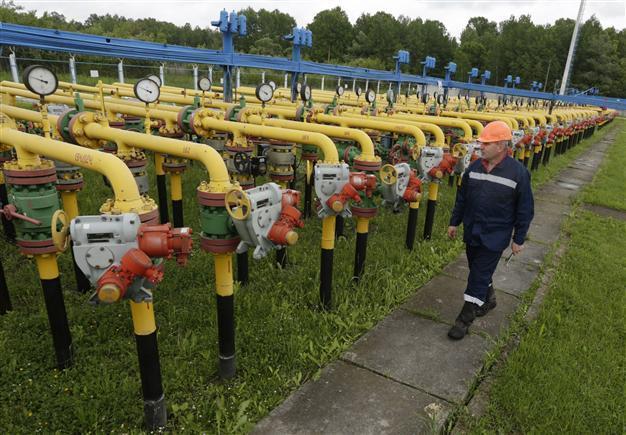IMF lowers Ukraine's 2015 growth projection to minus nine percent
WASHINGTON - Agence France-Presse

An employee checks equipment at the Dashava underground gas storage facility near Striy, outside Lviv, on May 28, 2015. AFP Photo
The IMF said May 31 it has lowered its growth forecast for Ukraine's war battered economy to minus nine percent, due in large part to "the unresolved conflict in the East."
The dismal projection -- down from a forecast in April of minus five percent -- followed a two-week-long visit by an International Monetary Fund delegation to Kiev earlier this month.
Inflation in Ukraine will hit an estimated 46 percent, officials said, largely due to the skyrocketing price of oil and a large exchange rate depreciation in February.
The Fund's Ukrainian mission chief Nikolay Gueorguiev said in a statement summing up the preliminary findings from the May 12-29 meetings, said the talks were "constructive."
The IMF did see some encouraging signs of growing stability, the Fund official said.
"In recent months, signs that economic stability is gradually taking hold are steadily emerging," said Gueorguiev.
"The foreign exchange market has remained broadly stable. Gross international reserves, although still very low, have increased to US$9.6 billion at end-April. Banks' deposits in domestic currency have been recovering," he said.
The IMF last month made a risky new $17.5 billion loan to Ukraine after eight failed programs with the country, stressing the government was committed to discipline and reform after decades of government mismanagement and corruption.
Fund officials have said that as recently as 2013 there was no will among Kiev's leaders to undertake the reforms needed to right its economy -- especially to counter massive corruption -- but that that appears to have changed under its new leadership.
Nevertheless, Ukraine's economy has been weighted down because of the ongoing conflict with pro-Moscow separatists that has left more than 6,000 dead.
The strain of the war has emptied the government's coffers and run down its foreign reserves to a bare minimum, putting it on track to default on its huge debt load.
